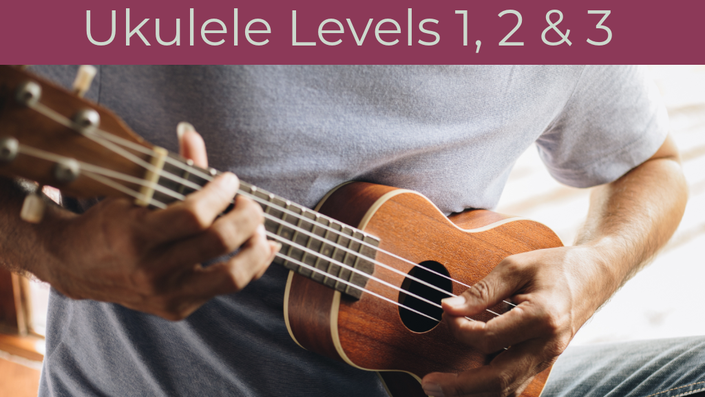
Waldorf Block: Ukulele Classes: Levels 1, 2 & 3
This set includes all the Ukulele classes by Dan Prindle - Levels, 1, 2 & 3
Benefits of learning the ukulele
Learning to play the ukulele offers a unique blend of benefits for individuals of all ages. Its accessibility, versatility, and the joy it brings make it an appealing choice for aspiring musicians and seasoned players alike.
1. Easy to learn
- Beginner-Friendly: The ukulele is often recommended for beginners due to its simplicity compared to other string instruments like the guitar. It's simple structure, with fewer strings, makes it less intimidating, especially for young learners.
- Faster Progress: You can learn basic chords and strumming patterns relatively quickly, allowing you to play complete songs in a short period.
- Gentle on Fingers: The ukulele's nylon strings are softer on the fingertips, making it a more comfortable experience for beginners compared to the steel strings of a guitar.
2. Accessible and affordable
- Cost-Effective: Ukuleles are generally less expensive than other instruments, making them an accessible option for those on a budget.
- Portable: Its small size and lightweight design make it easy to carry around and play anywhere, from the beach to a campfire.
3. Boosts mental well-being
- Stress Reduction: Playing an instrument like the ukulele can be a powerful stress reliever, promoting relaxation and mindfulness. Some research suggests it can lower levels of cortisol, a stress hormone.
- Brain Stimulation: Learning and playing music engages various brain areas, potentially enhancing memory, focus, problem-solving abilities, and cognitive function.
- Emotional Expression: The ukulele provides a creative outlet for expressing emotions and exploring musicality, fostering self-expression and potentially boosting confidence and self-esteem.
4. Social connection
- Community Building: The ukulele community is often described as warm and welcoming, providing opportunities to connect with like-minded individuals and build friendships through shared musical experiences.
- Collaboration: Joining ukulele groups or attending workshops fosters collaborative music-making and a sense of belonging.
5. Gateway to other instruments
- Transferable Skills: The skills learned on the ukulele, such as chord shapes, strumming patterns, and music theory, can provide a foundation for learning other instruments, especially the guitar.
- Confidence Building: Mastering the ukulele can build confidence and encourage individuals to explore more complex musical endeavors. Overall, the ukulele is a fun and rewarding instrument that offers a multitude of benefits, both for your musical journey and your overall well-being. Its ease of learning, affordability, and the joy it brings make it an excellent choice for anyone looking to embark on a musical adventure.
Your Instructor

A class designated as being taught by The BEarth Institute may involve multiple teachers. You can learn more about all of our teachers here: https://earthschooling.info/thebearthinstitute/about-us/gallery-3/
Classes that involve multiple teachers are as follows:
- Preschool & Kindergarten: Amy Cho and Safia Mandil (Stories, Crafts, and Circle Time)
- First Grade: Mellie Lonneman & Nicole Martinez (Main Lessons) & Mellie Lonneman, Rick Tan, Diane Power, Janet Walker, Megan Hammer, Cynthia Hansen, Brian Wolfe, Michelle Prindle, and Kristie Burns (Music, Art, Handwork & Eurythmy)
- Second Grade: Mellie Lonneman & Simone Blanchard (Main Lessons) & Mellie Lonneman, Diane Power, Rick Tan, Janet Walker, Megan Hammer, Cynthia Hansen, Brian Wolfe, and Kristie Burns (Music, Art, Handwork & Eurythmy)
- Third Grade: Mellie Lonneman & Amy Williams & Joy Cowburn (Main Lessons) & Mellie Lonneman, Rick Tan, Janet Walker, Megan Hammer, Cynthia Hansen, Brian Wolfe, and Kristie Burns (Music, Art, Handwork & Eurythmy)
- Fourth Grade: Mellie Lonneman & Nicole Martinez (Main Lessons) & Mellie Lonneman, Rick Tan, Janet Walker, Megan Hammer, Cynthia Hansen, Brian Wolfe, Dan Prindle, and Kristie Burns (Music, Art, Handwork & Eurythmy)
- Fifth Grade: Nicholas Andrea (Main Lessons) & Mellie Lonneman, Rick Tan, Janet Walker, Megan Hammer, Cynthia Hansen, Brian Wolfe, Dan Prindle, Catherine Allegretti, and Kristie Burns (Music, Art, Handwork & Eurythmy)
- Sixth Grade: Nicholas Andrea (Main Lessons) & Mellie Lonneman, Rick Tan, Janet Walker, Megan Hammer, Cynthia Hansen, Brian Wolfe, Dan Prindle, Robyn Beaufoy, and Kristie Burns (Music, Art, Handwork & Eurythmy)
- Seventh Grade: Stephanie Packer & Danielle Gair (Main Lessons) & Mellie Lonneman, Rick Tan, Janet Walker, Megan Hammer, Cynthia Hansen, Brian Wolfe, Dan Prindle, Catherine Allegretti, and Kristie Burns (Music, Art, Handwork & Eurythmy)
- Eighth Grade: Nicholas Andrea (Main Lessons) & Mellie Lonneman, Rick Tan, Janet Walker, Megan Hammer, Cynthia Hansen, Brian Wolfe, Dan Prindle, and Kristie Burns (Music, Art, Handwork & Eurythmy)
- Ninth Grade: Stephanie Packer, Natasha Sherwood, Kerry Burke, Dr. Chris Deason, Danielle Gair, Nicholas Andrea (Main Lessons) & Mellie Lonneman, Rick Tan, Janet Walker, Megan Hammer, Cynthia Hansen, Brian Wolfe, Dan Prindle, and Kristie Burns (Music, Art, Handwork & Eurythmy)
- Tenth Grade: Rachel Solt, Stephanie Packer, Natasha Sherwood, Kerry Burke, Dr. Chris Deason, Danielle Gair, Nicholas Andrea (Main Lessons) & Mellie Lonneman, Rick Tan, Janet Walker, Megan Hammer, Cynthia Hansen, Brian Wolfe, Michelle Prindle, and Kristie Burns (Music, Art, Handwork & Eurythmy)
- Eleventh Grade: Stephanie Packer, Danielle Gair, Mohsina Mandil (Main Lessons) & Mellie Lonneman, Rick Tan, Janet Walker, Megan Hammer, Cynthia Hansen, Brian Wolfe, and Kristie Burns (Music, Art, Handwork & Eurythmy)
- Twelfth Grade: Stephanie Packer, Mohsina Mandil & Mellie Lonneman, Rick Tan, Janet Walker, Megan Hammer, Cynthia Hansen, Brian Wolfe, and Kristie Burns (Music, Art, Handwork & Eurythmy)
Course Curriculum
Eighth Grade Music Lessons
Available in
days
days
after you enroll
-
StartLevel One: Lesson One: Ukulele (20:51)
-
StartLevel One: Lesson Two: Ukulele (24:16)
-
StartLevel One: Lesson Three: Ukulele (17:35)
-
StartLevel One: Lesson Four: Ukulele (26:58)
-
StartLevel One: Lesson Five: Ukulele (31:27)
-
StartLevel One: Lesson Six: Ukulele (28:28)
-
StartLevel One: Lesson Seven: Ukulele (29:22)
-
StartLevel One: Lesson Eight: Ukulele (16:55)
-
StartLevel Two: Lesson One: Ukulele (23:59)
-
StartLevel Two: Lesson Two: Ukulele (27:03)
-
StartLevel Two: Lesson Three: Ukulele (30:17)
-
StartLevel Two: Lesson Four: Ukulele (21:34)
-
StartLevel Two: Lesson Five: Ukulele (27:23)
-
StartLevel Two: Lesson Six: Ukulele (25:49)
-
StartLevel Two: Lesson Seven: Ukulele (22:53)
-
StartLevel Two: Lesson Eight: Ukulele (27:46)
-
StartLevel Three: Lesson One: Ukulele (26:39)
-
StartLevel Three: Lesson Two: Ukulele (28:10)
-
StartLevel Three: Lesson Three: Ukulele (22:41)
-
StartLevel Three: Lesson Four: Ukulele (27:14)
-
StartLevel Three: Lesson Five: Ukulele (25:08)
-
StartLevel Three: Lesson Six: Ukulele (27:04)
-
StartLevel Three: Lesson Seven: Ukulele (16:27)
-
StartLevel Three: Lesson Eight: Ukulele (22:12)
Frequently Asked Questions
When does the course start and finish?
The course starts now and never ends! It is a completely self-paced online course - you decide when you start and when you finish.
How long do I have access to the course?
How does lifetime access sound? After enrolling, you have unlimited access to this course for as long as you like - across any and all devices you own.
What if I am unhappy with the course?
We would never want you to be unhappy! If you are unsatisfied with your purchase, contact us in the first 30 days and we will give you a full refund.